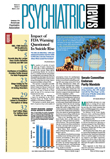Cyberonics Inc.'s vagus nerve stimulation (VNS) device was dealt two significant regulatory blows over the past two months from the Centers for Medicare and Medicaid Services and the Food and Drug Administration.
In a “Proposed Decision Memorandum” released February 5, the Medicare Coverage and Analysis Group at the Centers for Medicare and Medicaid Services (CMS) proposed that the federal health insurance program adopt a“ national noncoverage determination” for VNS.
CMS said the decision to not cover the average $15,000 cost of the device, plus an additional $10,000 in surgical and hospitalization costs associated with its implantation, was based upon the Medicare board's finding that VNS is“ not reasonable and necessary for treatment of resistant depression.”
Two weeks earlier, the Food and Drug Administration (FDA), during a public meeting of the agency's Neurological Devices Panel, reviewed the status of postapproval studies the agency had required Cyberonics to conduct as a condition of the device's initial approval in 2004. FDA officials noted that Cyberonics' efforts to complete the requested studies appeared to be on track but expressed concern over several barriers that could hamper Cyberonics' ability to complete the studies. These include the high cost of the device and its implantation and the lack of coverage by major third-party payers—perhaps including Medicare.
In February 2005 the FDA issued an approvable letter for VNS for treatment-resistant depression and conditioned final approval on the completion of a one-year, randomized, dose-ranging study and a five-year observational registry study. The FDA granted final approval on July 15, 2005, for the use of VNS as an “adjunctive long-term treatment of chronic or recurrent depression for patients 18 years of age or older who are experiencing a major depressive episode and have not had an adequate response to four or more anti-depressant treatments” (Psychiatric News, August 19).
According to Cyberonics, since the device's approval for treatment-resistant depression, approximately 2,200 patients have been treated with VNS, and about 280 insurers have provided coverage on a case-by-case basis.
Richard Rudolph, M.D., Cyberonics' chief medical officer, told members of the FDA's Neurological Devices Panel that the randomized dose-ranging study was under way, with 89 patients enrolled at 26 study sites as of the end of 2006. Because of the insurance-coverage problems that threaten completing the study on schedule, however, Cyberonics has decided to donate the devices and pay for all related implantation costs, he said.
Medicare does not have a “national coverage determination” on VNS for treatment of resistant depression. In its absence, coverage is determined by local Medicare contractors.
The adverse CMS decision was prompted by a formal request from Cyberonics in July 2006 asking regulators to approve coverage of VNS for a subset of patients with treatment-resistant depression—those who had or refused electroconvulsive therapy or who have been hospitalized for depression. Currently Medicare covers VNS only for “patients with medically refractory partial onset seizures, for whom surgery is not recommended or for whom surgery has failed.”
“We are extremely disappointed by the CMS proposal to decline our request for expanded coverage of VNS therapy to include that small subset of patients,” said George Parker, Cyberonics' interim chief operating officer. “These patients are experiencing a devastating illness associated with extremely high health care utilization, costs, and disability....A recent study has shown that annual medical costs associated with [this subset of patients] average approximately $47,000.”
More information on the request for Medicare coverage of VNS is posted at<www.cms.hhs.gov/mcd/viewdraftdecisionmemo.asp?id=195>.▪
